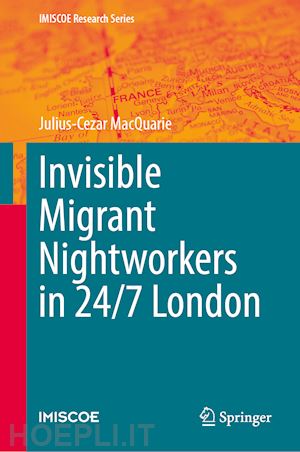
Questo prodotto usufruisce delle SPEDIZIONI GRATIS
selezionando l'opzione Corriere Veloce in fase di ordine.
Pagabile anche con Carta della cultura giovani e del merito, 18App Bonus Cultura e Carta del Docente
This book captures the hidden labour of migrant nightworkers in 24/7 London. It argues that late capitalism normalises nightwork, yet refuses to recognise the associated problems, from lack of decent working conditions to the seizure of the workers’ private time for self-development, family and social life. The book shows how the articulation of nightworkers’ subjectivities and socialities happens at the intersection between migration, precarity and nightwork, and traces how each of these dimensions magnifies the lived experience of the others. It further reveals that any possibilities for cooperation or solidarity in the workplace between migrant nightworkers become fragile and secondary to their survival of the nightshift. It also elucidates the mechanisms that hinder cohesion between vulnerable groups placed temporally and socially on a different par to the mainstream societies. As such, this book is an excellent resource for labour regulators, experts and student researchers in migration, work and gender.
The book offers a deeply empathic and engaging portrayal of the production of disciplined and exploitable manual labor in permanent nightshift cities. It cogently unpacks the experiences of embodied precarity through the largely unseen micro-practices of workplaces that entrap migrant laborers. The nightnographic component adds an original dimension to the inquiry.
Violetta Zentai, Central European University
Chapter 1. Introduction: Invisible Migrants.- Chapter 2. Nightnography: We Are Not Night Creatures.- Chapter 3. Half-rejected, Half-permitted Migrant Workers.- Chapter 4. Intersecting Hierarchies of Nightwork.- Chapter 5. The Normalisation of Nightwork.- Chapter 6. Habitus of Nightwork.- Chapter 7. Embodied Precariousness.- Chapter 8. Fragmented Cooperation.- Chapter 9. Conclusion: The Significance of Nightwork.- Chapter 10. Coda–Essential Yet Invisible, Pandemic or Not.
Julius-Cezar MacQuarie is a Marie-Sklodowska Curie Research Fellow at the Institute for Social Science in the 21st Century, University College Cork, Ireland where he conducts a project on Precarity in Women Migrant Nightworkers in Ireland. Over the years, he reached out to people inhabiting the night in various capacities: as a night ethnographer, migration scholar, outreach worker and collaborator with NGOs working with vulnerable groups. His Research interests include, night work in the nighttime economy, decent work agenda, international migration, and multi-modal nocturnal ethnography on migration and labour related dynamics.











Il sito utilizza cookie ed altri strumenti di tracciamento che raccolgono informazioni dal dispositivo dell’utente. Oltre ai cookie tecnici ed analitici aggregati, strettamente necessari per il funzionamento di questo sito web, previo consenso dell’utente possono essere installati cookie di profilazione e marketing e cookie dei social media. Cliccando su “Accetto tutti i cookie” saranno attivate tutte le categorie di cookie. Per accettare solo deterninate categorie di cookie, cliccare invece su “Impostazioni cookie”. Chiudendo il banner o continuando a navigare saranno installati solo cookie tecnici. Per maggiori dettagli, consultare la Cookie Policy.